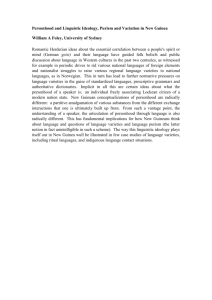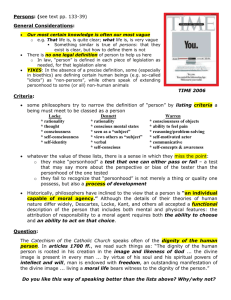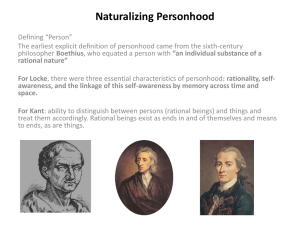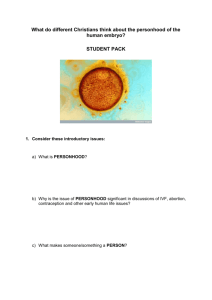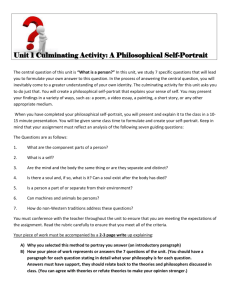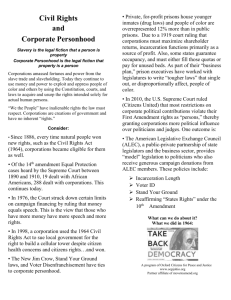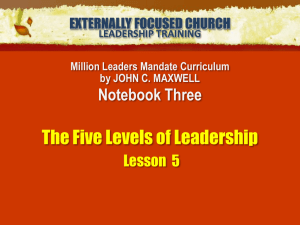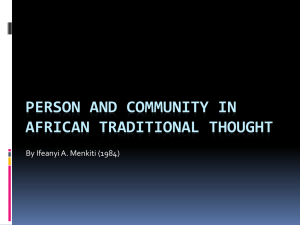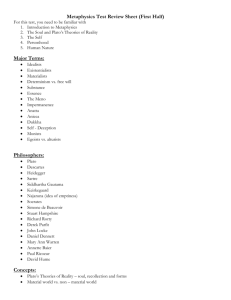SANCTITY OF LIFE - the Diocese of Leeds
advertisement
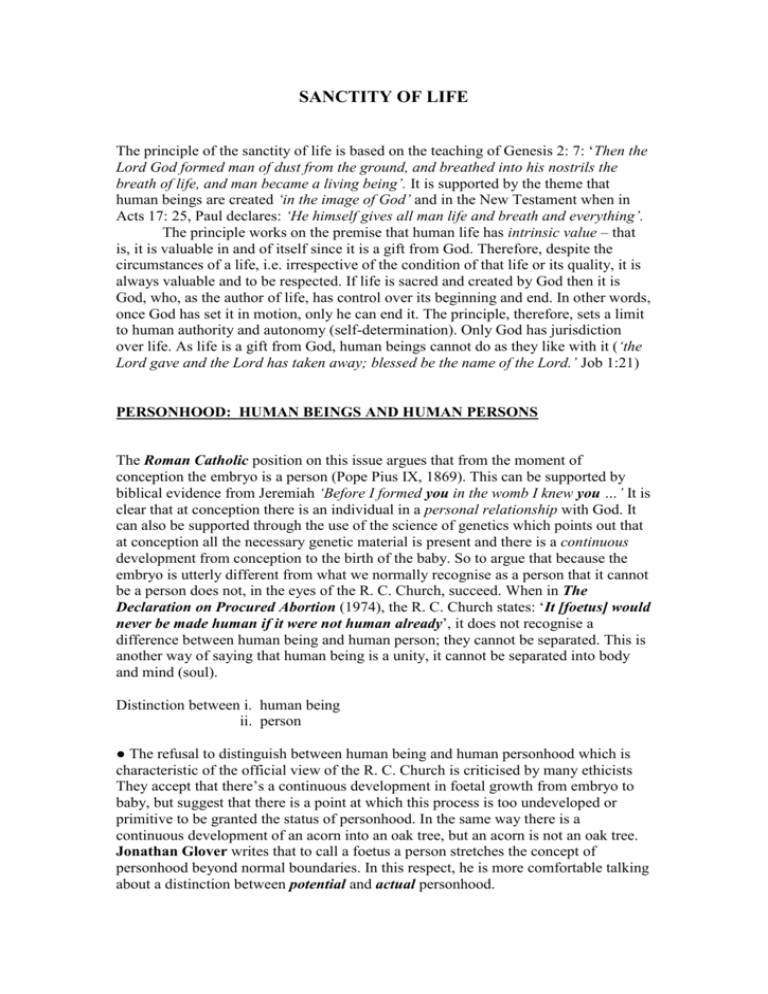
SANCTITY OF LIFE The principle of the sanctity of life is based on the teaching of Genesis 2: 7: ‘Then the Lord God formed man of dust from the ground, and breathed into his nostrils the breath of life, and man became a living being’. It is supported by the theme that human beings are created ‘in the image of God’ and in the New Testament when in Acts 17: 25, Paul declares: ‘He himself gives all man life and breath and everything’. The principle works on the premise that human life has intrinsic value – that is, it is valuable in and of itself since it is a gift from God. Therefore, despite the circumstances of a life, i.e. irrespective of the condition of that life or its quality, it is always valuable and to be respected. If life is sacred and created by God then it is God, who, as the author of life, has control over its beginning and end. In other words, once God has set it in motion, only he can end it. The principle, therefore, sets a limit to human authority and autonomy (self-determination). Only God has jurisdiction over life. As life is a gift from God, human beings cannot do as they like with it (‘the Lord gave and the Lord has taken away; blessed be the name of the Lord.’ Job 1:21) PERSONHOOD: HUMAN BEINGS AND HUMAN PERSONS The Roman Catholic position on this issue argues that from the moment of conception the embryo is a person (Pope Pius IX, 1869). This can be supported by biblical evidence from Jeremiah ‘Before I formed you in the womb I knew you …’ It is clear that at conception there is an individual in a personal relationship with God. It can also be supported through the use of the science of genetics which points out that at conception all the necessary genetic material is present and there is a continuous development from conception to the birth of the baby. So to argue that because the embryo is utterly different from what we normally recognise as a person that it cannot be a person does not, in the eyes of the R. C. Church, succeed. When in The Declaration on Procured Abortion (1974), the R. C. Church states: ‘It [foetus] would never be made human if it were not human already’, it does not recognise a difference between human being and human person; they cannot be separated. This is another way of saying that human being is a unity, it cannot be separated into body and mind (soul). Distinction between i. human being ii. person ● The refusal to distinguish between human being and human personhood which is characteristic of the official view of the R. C. Church is criticised by many ethicists They accept that there’s a continuous development in foetal growth from embryo to baby, but suggest that there is a point at which this process is too undeveloped or primitive to be granted the status of personhood. In the same way there is a continuous development of an acorn into an oak tree, but an acorn is not an oak tree. Jonathan Glover writes that to call a foetus a person stretches the concept of personhood beyond normal boundaries. In this respect, he is more comfortable talking about a distinction between potential and actual personhood. ● Some ethicists draw a distinction between the biological description of the human being and the human being as a person. This is generally argued on the grounds: ● that there is a difference between human being as a member of the species homosapiens and human being as a person. ● this then is further supported by investing all the characteristics of selfconsciousness and rationality into personhood (could be called ‘mind’ or ‘soul’) while characterising human being alone as biological (‘body’). Ronald Dworkins (Life’s Dominion 1993), uses two Greek terms for life, zoe for life as an animal and bios for an account of a person’s history and actions. He states that there is no philosophical problem determining when human zoe begins i.e. as soon as biological life has begun, but his/her bios is more difficult to decide. Peter Singer (Practical Ethics 1979) argues that whereas being homosapien can only apply to one biological species, i.e. human beings – being a person need not mean one is a homosapien – in other words, according to Singer, personhood could be descriptive of a number of species. On these grounds he believes that an adult chimpanzee has more value than a foetus or human embryo. Singer is suggesting that the simple fact that someone is a human being gives them no special status or claim to life over and above other species, only personhood does this. He is, in other words, suggesting that the principle of the sanctity of life must be replaced by the principle of the quality of life, since the sanctity of life argument is speciest: that is, it values human being above all other beings, whereas value for Singer comes from the quality of a being’s personhood. What Singer is after reflects dilemmas in modern life and medicine: he wants to embrace a utilitarian ethic where some human lives are valued and others are not. The problem with seeing all human beings as persons is that it immediately identifies them as moral agents with full rights whereas some situations appear to suggest otherwise: During war, the enemy is frequently seen as homosapien alone (i.e. animals) quite separate from the moral community. Human beings in a PVS (persistent/permanent vegetative state) are often seen as lacking the characteristics of personhood. Criminals who are executed are often seen as dangerous animals or beasts. Human embryos and the foetus are often seen as a mass of cells or an early form of biological life alone. In all these cases people are not granted personhood in order to justify their death. Jack Mahony (R. C.), in common with many ethicists including Singer, believes that the distinction between human being and personhood is found in the importance we, as human beings, attach to consciousness and rational life. His criteria for personhood include: - rationality – the power and use of reason in life - sentience – the ability to feel - emotions - free will and choice - continuity – being able to link one’s past, present and future Joseph Fletcher, the C. of E. theologian responsible for formulating ‘Situation Ethics’ lists his indicators of a worthwhile human life (personhood) as: - self-awareness self-control sense of the future sense of the past capacity to relate to others concern for others communication curiosity Jonathan Glover (Causing Death and Saving Lives 1977) suggests that a ‘life’ is not simply defined as a ‘body’ which is alive in biological terms, but always ‘conscious life’ where consciousness is exercised. In other words, personhood attaches to those people who have consciousness. He is particularly thinking of patients who are in a permanent coma or PVS. According to Glover, the death of these people is a ‘letting die’ not killing, since, for him, killing only takes place when a person is conscious (has consciousness). This argument also has implications for embryo research and abortion, since the presence of consciousness is open to debate in these areas. Though it may appear that Glover values the body more so than other ethicists, he believes the body has only instrumental value; the body is important insofar as it enables conscious experiences to be possible. ● Is it important that a human being possesses all these characteristics or only one or more to be a person? The arbitrary nature of this decision shows that personhood is difficult to determine. Stanley Hauerwas (U. S. Methodist), titles one of his essays on medical ethics, ‘My Uncle Charlie is Retarded but he’s still my Uncle Charlie’ Hauerwas is confident that despite lacking some characteristics of personhood his uncle is still a person. Therefore, who is to say that personhood cannot be granted to human beings irrespective of their stage of development? In other words, it is not always true that all human beings possess –at the same time- all the characteristics of personhood, but does this mean they are not persons? ● Is it possible to distinguish degrees of personhood? When Aristotle discussed what constitutes a person, he concluded with a proverb – ‘one swallow does not make a summer’. In his view, there is not one time or any individual characteristic which determines personhood; rather a person comprises a series of diverse experiences over a period of time – personhood in this respect is incremental; it develops over time. If this is so, we cannot point to a moment when someone becomes a person. This may seem to act as a support for those who deny personhood to the embryo and foetus, yet a strict application of personhood to human beings is only applicable as an evaluation of their whole lives. This is because Aristotle bases his ideas on the concept of teleology: that a person ought to be judged in line with whether or not his or her life has achieved its purpose, i.e. was a virtuous life. ● This way of arguing, brings to mind a problem with the use of ‘potential’ and ‘actual’ personhood. The trouble with the concept of ‘potentiality’ is that potential is not actual so that a human being with the potential to be a person cannot at this time be a person. Can we say, then, we are all persons to varying degrees, including embryos in this? Or is it better just to say personhood is an evaluative concept – an evaluation of a human life? EVALUATION OF THE HUMAN BEING / HUMAN PERSON DISTINCTION It is clear that many ethicists value the distinction since it supports the principle of the quality of life. This appears to mirror the situation of much modern medicine which makes judgements about people based on the quality of their lives. Furthermore, it is clear that the distinction between human being and human person relies on a dualism (seeing things as made up of two parts) between body and mind which goes back at least to the time of the Ancient Greeks. The question to ask, right at the outset, is: ‘does not this approach value the mind (rationality) above the body to such an extent that human beings ‘appear as a tube that is simply inflated by a mind’(Wittgenstein)?’ Doesn’t this view of human being trade on the idea that there is a self that inhabits a body as if the latter were a host which is not as important and will be at some stage discarded? Against all this, the Christian doctrine of the Incarnation – that Christ ‘became flesh’ makes for a very positive understanding of the body. Furthermore, the doctrine of the resurrection of the body not the survival of the ‘soul’ shows that a human being is one thing not a division into two parts ‘body’ and ‘soul’. Finally, those who support the principle of the sanctity of human life, like Jerome Wernow (1995), reject the principle of the quality of life for four reasons: 1. The QOL permits too much group and peer pressure and power. 2. The QOL inevitably leads to a slippery slope argument whereby killing humans initially for good reasons inevitably results in less good reasons being adopted in other cases. 3. QOL reduces a person’s autonomy. Doctors can refuse treatment because they think that a patient’s life is no longer worthwhile. 4. QOL fails to treat humans with equal dignity.
